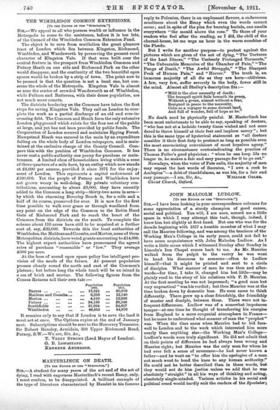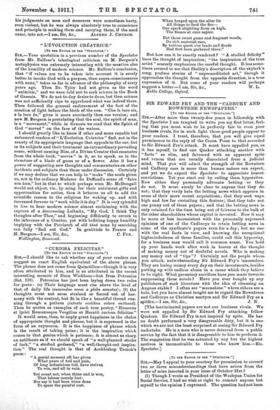JOHN MALCOLM LUDLOW.
[To THE EDITOR OP THE "SPECTATOR."] SIR,—I have been looking in your correspondence columns for some appreciation of a sturdy champion of good causes, social and political. You will, I am sure, accord me a little space in which I may attempt this task, though, indeed, I knew him but slightly at first hand. But one who was for the decade beginning with 1857 a humble member of what I may call the Maurice following, and was among the teachers of the Working Men's College in its early years, could not fail to have some acquaintance with John Malcolm Ludlow. As I write a little scene which I witnessed Sunday after Sunday in Lincoln's Inn Chapel comes back to me. As Mr. Maurice walked from the pulpit to the vestry he was wont to hand his discourse to someone—often to Ludlow himself—that it might be printed and sent to a circle of disciples. What manner of man he was then and after- wards—for time, I take it, changed him but little—may be plainly read in the story of his relations with F. D. Maurice. At the first meeting he was not impressed; "a good man but very unpractical " was his verdict ; but then Maurice was at the time broken down by domestic loss. He soon came to think differently. There grew up a close friendship, the friendship of master and disciple, between them. There were not in- frequent differences. Ludlow was of a somewhat impetuous temper—at one time he thought of transferring his energies from England to a more congenial atmosphere in France— but he came to understand what manner of man the " prophet " was. When the time came when Maurice had to bid fare- well to London and to the work which interested him more nearly than anything else—the Working Men's College— Ludlow's words were truly significant. He did not admit that on their points of difference he had always been wrong and Maurice right ; but Maurice was the only man for whom he had ever felt a sense of reverence—he had never known a father—and he went on " to offer him the apologies of a man not much wont to bend the knee to any human authority." He could not be better described than in these words, but they would not do him justice unless we add that he was absolutely "straight" in all his ways of thinking and acting, absolutely single-minded. Various articles in his social and political creed would hardly suit the readers of the Spectator;
his judgments on men and measures were sometimes hasty, even violent, but he was always absolutely true to conscience and principle in making them and carrying them, if the need







































































 Previous page
Previous page